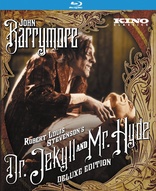Dr. Jekyll and Mr. Hyde Blu-ray Movie
HomeDr. Jekyll and Mr. Hyde Blu-ray Movie 
Deluxe EditionKino Lorber | 1920 | 79 min | Unrated | Jan 28, 2014
Movie rating
7.1 | / 10 |
Blu-ray rating
| Users | 0.0 | |
| Reviewer | 4.0 | |
| Overall | 4.0 |
Overview
Dr. Jekyll and Mr. Hyde (1920)
Considered by many to be the first great American horror film, John S. Robertson's DR. JEKYLL AND MR. HYDE allowed stage legend John Barrymore to deliver his first virtuoso performance on film. Blending historic charm with grim naturalism, this version of DR. JEKYLL AND MR. HYDE is one of the more faithful of the many screen adaptations of Stevenson's story (though greatly influenced by T.R. Sullivan's popular stage treatment), recounting a visionary scientist's ill-fated attempts to unleash the human mysteries that dwell beneath the shell of the civilized self.
Starring: John Barrymore, Brandon Hurst, Martha Mansfield, Charles Lane, Cecil ClovellyDirector: John S. Robertson
| Horror | 100% |
Specifications
Video
Video codec: MPEG-4 AVC
Video resolution: 1080p
Aspect ratio: 1.25:1
Original aspect ratio: 1.33:1
Audio
Music: LPCM 2.0
Silent Film
Subtitles
None
Discs
50GB Blu-ray Disc
Single disc (1 BD)
Playback
Region A, B (C untested)
Review
Rating summary
| Movie | 4.0 | |
| Video | 3.5 | |
| Audio | 4.5 | |
| Extras | 3.0 | |
| Overall | 4.0 |
Dr. Jekyll and Mr. Hyde Blu-ray Movie Review
The Better and Worse Angels of Our Nature
Reviewed by Casey Broadwater January 28, 2014The angel on one shoulder and the devil on the other. Freud's lusty, animalistic id and regulating, punishment-wary ego. The two faces of the Roman god Janus (or Two-Face, for that matter, Batman's enemy). There are endless manifestations of the idea that human beings are in possession of dual natures—good and evil—which are constantly at odds. In fiction, of course, one of the most obvious examples is Robert Louis Stevenson's Strange Case of Dr Jekyll and Mr Hyde, an 1886 novel steeped in the oppressive morality of the Victorian era, when the importance of appearances—and the demands of one's social stature—strictly regulated what should or should not be done. Not that this is any different now.
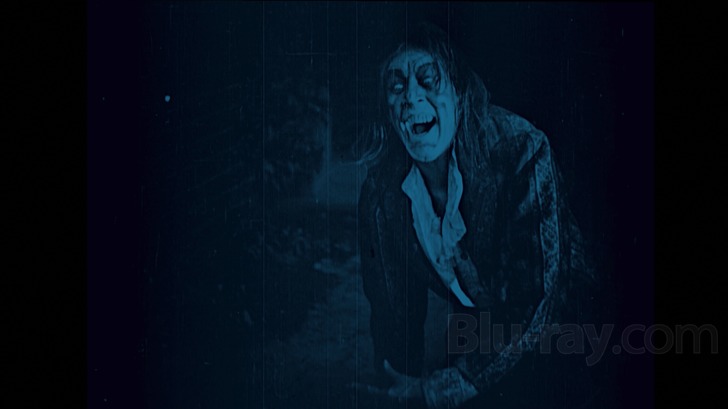
Mr. Hyde
Stevenson himself was quick to cast off the mores of the day; born to firm Presbyterian parents, he became a long-haired, atheistic-leaning bohemian who wrote that "to make our idea of morality centre on forbidden acts is to defile the imagination and to introduce into our judgments of our fellow-men a secret element of gusto." He preferred instead a simpler, more humanistic view of right and wrong, where "Gentleness and cheerfulness...come before all morality." His Dr. Jekyll and Mr. Hyde is, on one level, a trenchant commentary on Victorian society's tendency to compartmentalize "evil" and hide it under the guise of respectability. Think of a "gentleman's club," where the debaucheries that go on inside are decidedly not gentlemanly. Or, in more modern times, the anti-child pornography crusader who is eventually found out as a secret pedophile. Stevenson's point seems to be that, in refusing to even acknowledge the darker side of our nature, we inadvertently encourage evil to fester and grow in some segregated part of our personality. And, inevitably, it will worm its way to the surface, uglier than ever.
Blending allegory with "genre" elements of murder and mystery, Stevenson's novel was a massive success—read far and wide and even quoted by ministers lecturing on the dangers of hypocrisy—and has since spawned endless adaptations, imitations, and parodies, rivaling even the Sherlock Holmes series for film and television iterations. The silent era alone produced at least eight screen versions of the novel, and the most famous of these is probably 1920's Dr. Jekyll and Mr. Hyde, directed by John S. Robertson and based less on the original novel than on the 1887 stage play by Thomas Russell Sullivan, who simplified the psychology of the story and added an unnecessary love interest.
The film stars the charming and handsome John Barrymore, a perfect fit for Dr. Jekyll, an "idealist and philanthropist" who appears to stand for all that is righteous and just. He does scientific research by day and runs a pro-bono clinic for the poor and sick by night, which leaves him with little time for his long-suffering fiancé, Millicent Carew (Martha Mansfield). Millicent's father, George (Brandon Hurst), is a world-wise hedonist who doesn't believe Jekyll is as pure a do-gooder as he seems, so he takes the doctor out for a night at a backstreet burlesque club, where Jekyll falls in lust with a dancing seductress (Nita Naldi), allowing his baser nature to awaken "for the first time."
Jekyll becomes obsessed with separating his noble and ignoble instincts into separate bodies—allowing him to "commit every evil act but leave the soul untouched"—and to this end creates a potion that does just that. Upon drinking it, he morphs—via crossfade—into the hunched and twisted Mr. Hyde, a syphilitic-looking monster with scraggly hair and jagged teeth and fungus- thickened fingernails. Like Max Schreck in Nosferatu, Mr. Hyde is evil personified, and he goes on a nightly rampage through the seedy quarters of Victorian London, whoring, setting up a lair of depravity and, once, even stepping on a young boy for no other reason than that it gives him a sick glee. As Hyde's influence grows, Dr. Jekyll is inevitably affected and begins losing control over both the transformations and his ability to cover his own tracks. Dark secrets always come to light in the end.
John S. Robertson and his cinematographer devise some eerie imagery—like the double exposure of a giant spider creeping up on Jekyll/Hyde in bed—but the film's lasting success is almost entirely predicated on John Barrymore's schizo performance, oscillating from genteel man of science to criminally insane lech and back again. His transformation is to-this-day chilling, and not just in regard to the physical changes. Something switches behind his eyes, which go outright maniacal, and his whole bearing follows suit, taking on a shifty, rabid-animal quality, tensed and bloodthirsty and deranged. You could easily believe you were watching the work of two different actors, one of them just maybe a legitimate lunatic.
Dr. Jekyll and Mr. Hyde Blu-ray Movie, Video Quality 
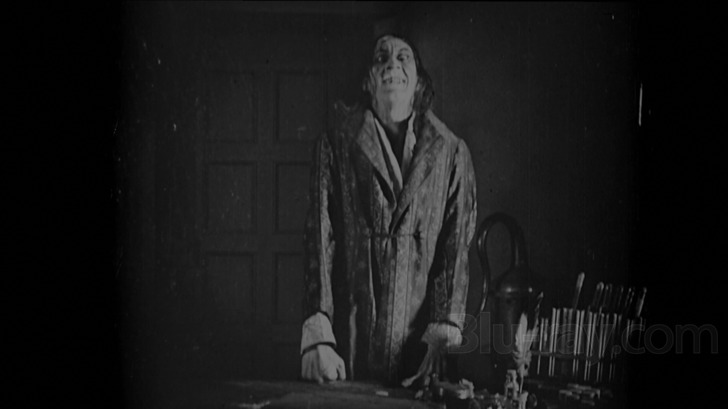
Dr. Jekyll and Mr. Hyde is in the public domain and can be viewed for free online—there's a decent copy on The Internet Archive—but Kino-Lorber's new Blu-ray release is by far the best current way to watch the film. Just don't expect a miraculous restoration. As per Kino-Lorber's custom, the archival 35mm film elements used for this 1080p/AVC-encoded transfer have been largely left as-is, with no significant digital touchups. Specks and scratches of variable sizes mark just about every second of footage, 35mm film sprockets can sometimes be seen on the right side of the image, and there are also some occasional dropped frames. Additionally, there are two brief scenes early in the film that are clearly taken from lesser, standard definition sources. On the whole, though, the film's HD debut is very satisfying. There's a marked improvement in clarity, rendering details that would simply disappear on DVD, and though the picture occasionally looks a little dim—white are rarely bright— there are no issues with heavily crushed shadows or other distracting contrast problems. Likewise, there are no noticeable compression hiccups in the encode. If not perfect, this is certainly the best Dr. Jekyll and Mr. Hyde has ever looked on home video.
Dr. Jekyll and Mr. Hyde Blu-ray Movie, Audio Quality 
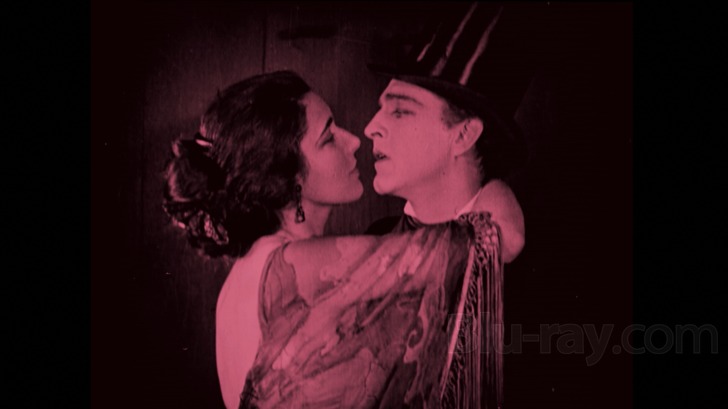
Presented in uncompressed Linear PCM 2.0 form, the disc features an eerie Rodney Sauer score performed by the Mont Alto Motion Picture Orchestra, both of whom are no strangers to Kino-Lorber silent film releases. The music complements the onscreen action well and sounds great too. No subtitles are included, but—obviously—none are required.
Dr. Jekyll and Mr. Hyde Blu-ray Movie, Special Features and Extras 
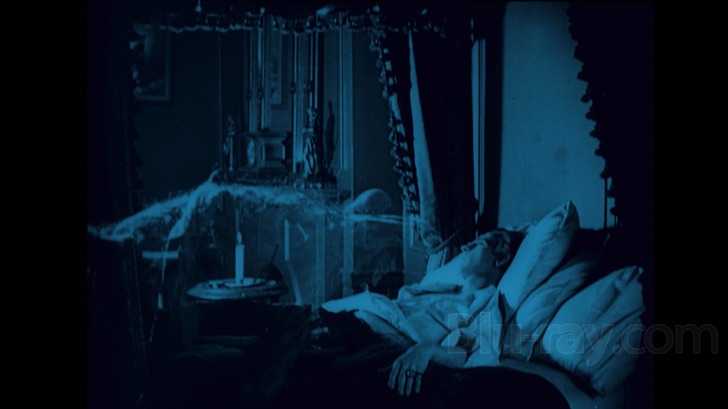
- The 1912 Version (HD, 13:48): An early single-reel adaptation of the story, starring future director James Cruze.
- The Rival 1920 Version (HD, 14:44): An excerpt from a rip-off film, directed by Louis B. Mayer, meant to capitalize on the success of the Barrymore version.
- Dr. Pyckle and Mr. Pride (HD, 21:30): A slapstick Stan Laurel two-reeler from 1925 that spoofs the film.
- The Transformation Scene (audio, 2:42): Taken from a rare Columbia record, here you'll hear recording artist Len Spenser act out the final scene of Dr. Jekyll and Mr. Hyde.
Dr. Jekyll and Mr. Hyde Blu-ray Movie, Overall Score and Recommendation 
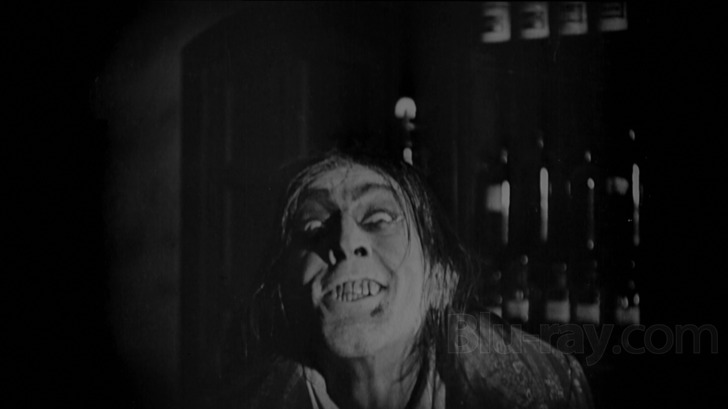
Of the many, many film adaptation of The Strange Case of Dr. Jekyll and Mr. Hyde, this 1920 version stands out for the sheer creepiness of John Barrymore's gnarled, pent-up performance. As the screenshots above attest, there's definitely some unsettling imagery here, and you could certainly make the case for this being an early American horror classic. Given that the film is in the public domain and can be watched for free online, any home video release needs to convince us that it's worth purchasing; fortunately, Kino-Lorber's new Blu-ray does this handily, featuring some excellent supplements, a solid HD presentation, and a score from the Mont Alto Motion Picture Orchestra. Recommended for all fans of silent horror.
Similar titles
Similar titles you might also like

Dr. Jekyll and Mr. Hyde
Warner Archive Collection
1931

Horror of Dracula
Dracula / Warner Archive Collection
1958

The Last Voyage of the Demeter
Collector's Edition
2023

The Uncanny
1977

Antibirth
2016

The Devil Within Her
Sharon's Baby / I Don't Want to Be Born / It's Growing Inside Her
1975

The Hallow
The Woods
2015

Late Phases: Night of the Lone Wolf
Late Phases
2014

Death Line 4K
Raw Meat
1972

Masters of Horror: Season One, Volume I
2005

Curse of the Demon
Night of the Demon
1957

Demons 2
Dèmoni 2... l'incubo ritorna
1986

The Creep Behind the Camera / The Creeping Terror
1964

Neon Maniacs
Limited to 1200 Copies
1986

The Quatermass Xperiment
Special Edition | The Creeping Unknown
1955

Sting of Death
1966

Konga
1961

The Creeping Flesh
1973

Dracula
Collector's Edition with Theatrical & Badham color
1979

Dog Soldiers
Collector's Edition
2002
